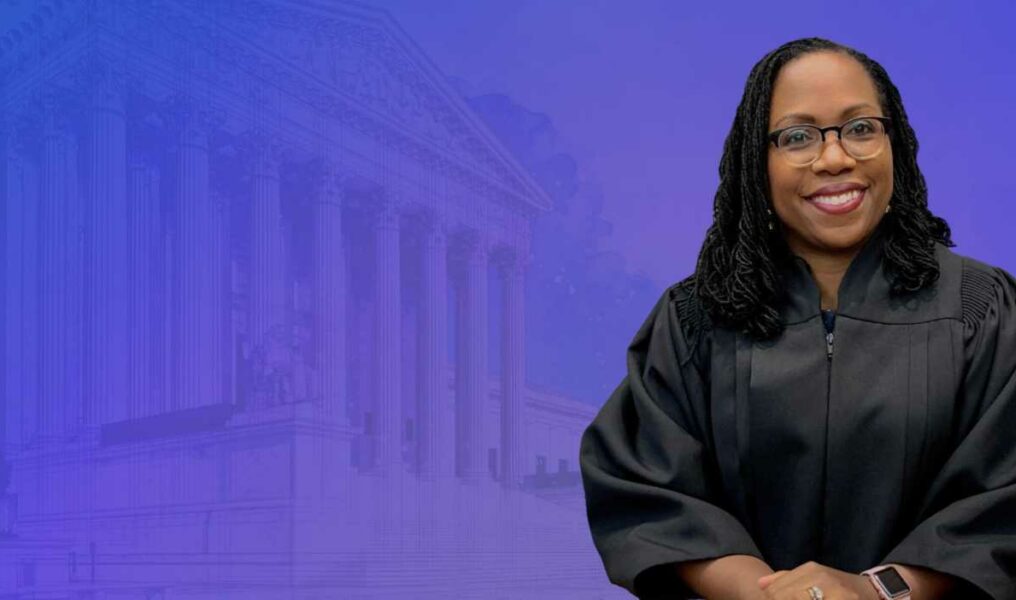Justice Jackson, the First Black Woman to Serve on the Supreme Court, Has Been Confirmed: What Does It Mean for the LGBTQ+ Community?

With Thursday’s historic confirmation of Judge Ketanji Brown Jackson to succeed Justice Stephen Breyer on the U.S. Supreme Court (SCOTUS), many in the LGBTQ+ community are left to wonder how, and even if, it will have an impact on issues like gay marriage and trans rights.
Jackson, who becomes the nation’s first Black woman to serve on the nation’s highest court, received an endorsement from the Human Rights Campaign, which noted that the LGBTQ+ community “depends on the Court to enforce constitutional protections and civil rights statutes and to fairly interpret them in ways that protect our community. We must insist that any Supreme Court justice maintain due respect for the dignity and equality of LGBTQ+ people. We are confident that Judge Jackson would surpass this bar and would be an exceptionally qualified and influential addition to the Court.”
Indeed, upon her confirmation by a bipartisan 53-47 vote, HRC Interim President Joni Madison issued a statement calling the moment “powerful, meaningful, and long overdue,” adding, “There is no question that soon-to-be Justice Jackson will be a fierce defender, champion and ally to marginalized communities, including the LGBTQ+ community, who are at-risk of having their rights watered down or stripped from them by the Court’s conservative majority. We have a long road ahead of us, and a lot of work to do, but today’s victory reminds us all why the fight is worth it.”
That sentiment was echoed by John. E. Johnson, Jr., executive director of the Michigan Department of Civil Rights. While his statement did not specifically mention the LGBTQ+ community, he did note that “Justice Jackson brings a rich, nuanced and invaluable perspective on the implications and impact of the court’s decisions on the lived experience of real people and their families.”
One key case that will be coming to the court is 303 Creative LLC v. Elenis, which was brought by a Colorado-based web designer who refused to create websites for same-sex couples. Identifying herself as a practicing Christian, she violated the state’s anti-discrimination law when she wanted to post her rationale for refusing service on her website, setting up a battle between Colorado's anti-discrimination law and the First Amendment's Free Speech Clause.
Kevin Tobia, a Georgetown University Law Center professor, told CNN that this type of case is likely to come before the court in a variety of ways. "We're already seeing some cases like this,” said Tobia, “but I imagine that we'll see more along these lines, cases seeking religion or speech-based allowances to discriminate against LGBTQ Americans."
While Judge Jackson can’t be officially sworn in until Justice Breyer formally retires at the end of the current term, that particular case is expected to come in the next term, which will begin in September. But again, her vote will simply replace that of Breyer, who has been a stalwart defender of LGBTQ+ rights.
However, the push by the GOP to roll back some of those gains came into focus during Jackson's confirmation hearings last month, with Sen. John Cornyn (R-Texas) questioning whether marriage equality, seemingly decided in 2015’s historic Obergefell decision, was settled law as the word “marriage” wasn’t mentioned in the Constitution.
The Obergefell ruling, which declared all same-sex marriage bans as unconstitutional, had a strong Michigan connection as one of the four cases it included, DeBoer v. Snyder, was represented by then private attorney Dana Nessel, now Michigan’s Attorney General.
Other issues that are working their way through GOP-controlled states and may land at the Supreme Court include anti-transgender sports bans like those signed into law last week in Arizona and Oklahoma, as well as anti-gay curriculum laws like Florida’s notorious "Don't Say Gay" law.
However, the fact remains that the balance on the court remains 6-3 in favor of conservative justices who have each demonstrated in various ways their willingness to undo some of the protections the LGBTQ+ community have come to depend on. But with her relatively young age, 51, there is hope that it could place her in a position to one day be a key swing vote.
As the HRC noted, “While Judge Jackson’s docket has not touched directly upon issues of LGBTQ+ rights, in other public remarks, she has highlighted the historical connections between LGBTQ+ rights and civil rights for other marginalized groups and rightly framed the Obergefell decision alongside Supreme Court precedents about constitutional protections involving privacy and interracial marriage.”









